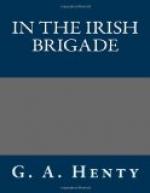By this time, however, the knowledge that the king of France was entering into negotiations, which would necessitate his desertion of Spain, greatly excited the population against the French stationed in the capital. They were hissed and hooted when they appeared in the streets, and for a time, the indignation was so great that the troops were ordered to remain in their barracks. The king himself, however, gained rather than lost popularity, as he issued a proclamation to the people, saying that, having accepted their invitation to be their king, he would remain with them until driven from his throne by force; and he confided absolutely in their affection, and aid, to enable him to withstand any foes who might attempt to dethrone him.
In the autumn another change occurred. Although, in order to obtain peace, he had granted all the demands, however exorbitant, of the allies, and had undertaken to withdraw his troops from Spain, Louis stood firm when to these conditions they added another, namely, that he should himself undertake, by force, to dethrone his grandson. This monstrous demand united, at once, both those who wished to continue the war rather than grant such humiliating terms as those which had been insisted upon, and the party who were in favour of peace, even at that cost. The negotiations were abruptly broken off, and the French troops, who were already on the march towards the frontier, received orders to remain in Spain.
Now that he had O’Neil with him, the time in Madrid passed more pleasantly for Desmond than before. He was frequently away for several days, carrying despatches to the commanders of the forces in Valencia and Barcelona. In the capital the French were again regarded as friends, and as several successes had been gained and places captured, in Catalonia, the hope that the civil war that had so long been waged was approaching its end, and the confidence engendered by the victory on the Caya, made the people doubt whether any attempt at invasion from the west would be contemplated, and they gave themselves up to gaiety. Balls and fetes were frequently organized, and at these the French were among the most honoured guests.
Early in the spring preparations were made for active operations. Lieutenant General O’Mahony had just returned from Sicily, where he had rendered distinguished service. In the previous year, Crofton had been made a major general, and two new regiments of Irish infantry had been formed, of deserters from the enemy in Catalonia and Portugal. These were commanded by Colonel Dermond M’Auliffe and Colonel John Comerford. These two regiments, with another under Colonel Macdonald, marched from Madrid in April.
As the Marquis de Bay was not yet moving he offered O’Mahony, who had the command of the force, the services of Desmond and O’Neil as aides-de-camp. The offer was a welcome one, for, as none of the men in the newly raised regiments was acquainted with the language, Desmond, who now spoke Spanish well, would be far more valuable to him than Spanish officers could be.




